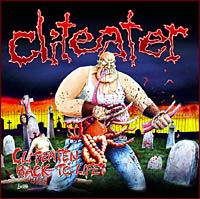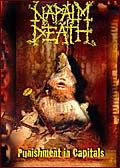CLITEATER (nl) - Cliteaten Back To Life (2013)

Label : War Anthem Records
Sortie du Scud : 8 mars 2013
Pays : Pays-Bas
Genre : Goregrind
Type : Album
Playtime : 18 Titres - 42 Mins
Après avoir parodié le Kill 'Em All de METALLICA avec Clit 'Em All en 2003, après avoir moqué le Speak English Or Die de STORMTROOPERS OF DEATH avec Eat Clit Or Die en 2005, après avoir raillé le Scream Bloody Gore de DEATH avec Scream Bloody Clit en 2008 puis le The Great Southern Trendkill de PANTERA avec The Great Southern Clitkill en 2010, les affreux polissons de CLITEATER s'attaquent en 2013 à un nouveau monument du monde Metal. A quelques jours du 1er avril, jour de fête pour les poissons du monde entier, ces Néerlandais se lancent dans le détournement d'un des groupes les plus mythiques du Death Metal : CANNIBAL CORPSE. Comme souvent avec eux, c'est le premier album des formations ciblées (en l'occurrence, le Eaten Back To Life de 1990) qui sera l'objet d'une réinterprétation visuelle et orthographique aussi drôle que le coup du caca sous le paillasson enflammé. Sauf que comme souvent avec eux, la blague tourne au drame avec au bout, des corps d'enfants carbonisés dans des appartements dévastés. On ne rit plus.
Cliteaten Back To Life, c'est l'album de Goregrind chiant comme la mort par excellence. Tout s'enchaîne à une vitesse démesurée, dans le plus grand irrespect des normes musicales traditionnelles. Ce n'est pas choquant, ce n'est pas dérangeant, pour la simple et bonne raison que Goregrind rime avec second degré, m'en-foutisme, légèreté et parfois, puérilité. Ce qui est chagrinant, par contre, c'est que ces garçons font un peu ce que faisaient leurs compatriotes de LAST DAYS OF HUMANITY, en moins jusqu'au-boutiste. Aux Pays-Bas, il y a ROMPEPROP, il y a RECTAL SMEGMA, il y a SKULLHOG qui œuvrent déjà dans des registres similaires et je pense que si on connaît ces trois là, on a tout de suite compris l'essence d'un CLITEATER. Ce cinquième album en devient alors inintéressant, pas parce qu'il est particulièrement désagréable à l'oreille, mais parce qu'il ne se démarque pas dans un style où l'excentricité autorise les dérapages les plus improbables. Grouillant de samples et de morceaux expéditifs qui défilent machinalement, Cliteaten Back To Life s'articule autour de guitares grasses et broyées en soutien d'un chant gargarisé assez performant pour le style. C'est peut-être la force de CLITEATER, qui a tort de miser sur le traditionalisme pour s'en sortir. Pour preuve, il ne se passe rien les trois quarts du temps, sauf sur les compositions qui sortent du schéma Grind bête et méchant (plus bête que méchant d'ailleurs). La simpliste "Redneck Rampage" fonctionne assez bien, le groove de "The Beast" et de "Slimming Party At Kelly's" également mais par-dessus tout, c'est "Positive Aspects Of Collective Chaos" qui obtiendra mon vote. D'une, pour l'hystérie apocalyptique qui surgit dès la première seconde. De deux, pour la cassure "flower-power-baba-cool-laisse-moi-tirer-une-latte-cousin" à partir de 0'49''. Cette création originale et délirante suffirait presque à mon bonheur, mais c'est oublier trop vite qu'à côté de ça, il y a une quinzaine de compositions qui galèrent pour rendre CLITEATER crédible.
On s'en sort donc avec un trauma facial pour seul et unique plaisir. Cliteaten Back To Life a beau être spontané, pas très sérieux (voir franchement débile), on a déjà passé de meilleurs moments sur des albums du même style. Pour un groupe originaire d'Helden, dont la traduction est "Héros" en allemand, être la caricature de l'antihéros de base du Goregrind, c'est quand même sacrément culoté, et au final pas très glorifiant. Pour y croire encore, on peut toujours se dire que l'inspiration viendra le jour où ils parodieront les Grands Succès Du Musette d'Yvette Horner, ce qui serait, avouons-le, autrement plus culte.
Ajouté : Mercredi 25 Septembre 2013
Chroniqueur : Stef.
Score :   
Lien en relation: Cliteater Website
Hits: 9832
|














